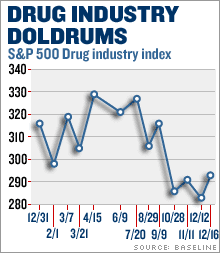 |
| Drug stocks took a 7.3 percent dive this year, hitting the low point on Dec. 12. |
|
|
|
NEW YORK (CNNMoney.com) -
Drug stocks took a pummeling in 2005, sliding in value and underperforming the S&P index, and analysts are mixed as to what Baby New Year will bring.
Pharmaceutical companies traded on the S&P dropped 7.3 percent this year through Dec. 16, the most recent figure available from Thomson/Baseline. The S&P index rose 4.6 percent during the same period. This caps a five-year period during which drug companies underperformed the S&P 500 by 37 percent.
Worried investors
Gbola Amusa, an analyst for Bernstein, said American drugmakers were hampered by "overhanging" issues "that increasingly came to the attention of investors in 2005."
These issues included Merck's ongoing Vioxx debacle, the now-resolved patent battle over Pfizer's Lipitor, and an estimated $21 billion of branded drugs that are expected to go off patent in 2006.
Drug stocks have experienced an upturn in the last few days, but they're still recovering from the year's low point so far, which was Dec. 12.
On Dec. 12, a mistrial was declared in the third Vioxx case by the federal district court in Houston. Merck (down $0.07 to $32.18, Research) pulled the blockbuster painkiller off the market on Sept. 30, 2004 after a study demonstrated its link to heart attacks, and since that time more than 9,000 lawsuits have been filed against the company by plaintiffs who blame Vioxx for heart attacks. Merck lost the first case in state court in Texas but won the second, in its home state of New Jersey.
Also on that day, Bristol-Myers Squibb (down $0.34 to $22.15, Research) announced plans to cut $1 billion in company costs as it faces the 2006 patent expiration for Pravachol, a cholesterol-cutting statin and the company's second-biggest seller, which had $2.6 billion in 2004 sales.
Disappearing patents
So what can investors expect to find in 2006?
"The U.S. [drug companies] are facing some of the most important patent expirations in history in 2006," said Bernstein's Amusa. "A lot of people would rather be underweight in these names rather than market weight."
Amusa noted that Pfizer faces the impending patent expiration on Zithromax, a treatment for bronchitis, pneumonia and other infections that totaled $1.9 billion in 2004 sales, and on the antidepressant Zoloft, which had $3.4 billion in sales that year. Merck faces the expiration of Zocor, a cholesterol-cutting statin with $5.2 billion in 2004 sales, while the patent for Bristol-Myers' Pravachol is also set to expire.
The good news
But some positive news has emerged for the industry in the last few days of 2005. Late on Friday, Pfizer (down $0.22 to $24.10, Research) defeated a patent challenge from Indian generic maker Ranbaxy over cholesterol-cutting Lipitor, the top-selling drug of all time and the first ever to exceed $10 billion in annual sales. Pfizer's shares shot up more than 7.7 percent during Monday morning trading. This prompted Chris Schott, analyst for Bank of America Securities, to project Pfizer earnings growth of 5 percent in 2006. Barbara Ryan, analyst for Deutsche Bank North America, raised her 12-month price target for Pfizer's stock to $34 per share, up from $27.
Robert Hazlett, analyst for Suntrust Robinson Humphrey, said the ruling on Lipitor in Pfizer's favor could be a harbinger for future patent battles. He said Pfizer's Lipitor victory shows that investors "can now operate under the basic understanding that the most basic patents on novel compounds offer significant protection."
In other good news, Merck held an analysts' meeting last week where it announced plans to increase its cost cutting to $5 billion, and unveiled a pipeline of vaccine products that may be on the market by next year. In addition, on Dec. 1 Merck filed an application with the FDA for Gardasil, a vaccine to prevent cervical cancer, and on Friday released new data showing another potential use for the drug. On Monday, Ryan of Deutsche Bank raised her Merck rating to "buy" after having kept it on "hold" since 2001.
Hazlett of Suntrust Robinson Humphrey said the drug industry may be able to produce enough new products in 2006 to offset much of the losses from patent expirations.
"Despite some significant patent expirations in 2006, we are starting to see greater numbers of late stage products enter the market, and that should bolster the group despite the generic challenges," said Hazlett.
To read more about the Lipitor challenge, click here.

|